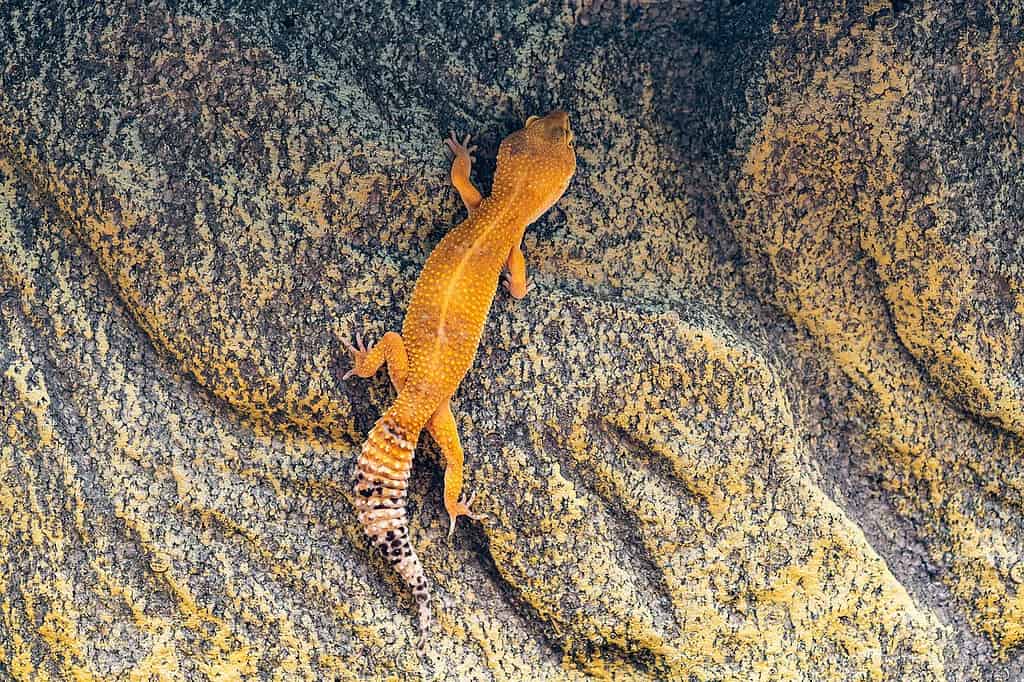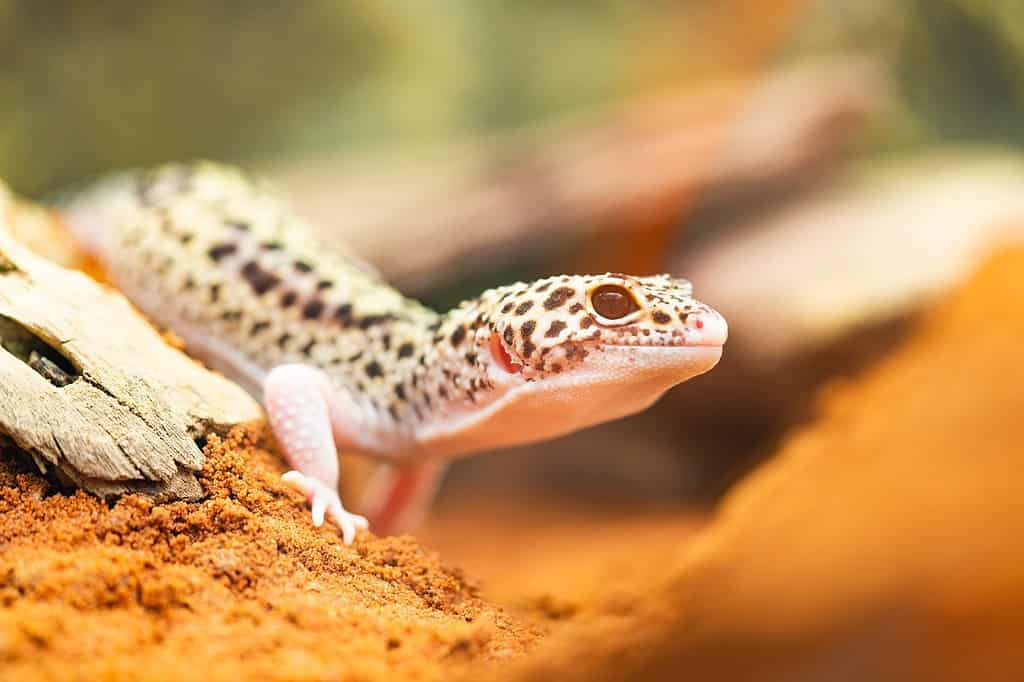Leopard geckos are one of the most popular pets in the reptile world. They’re small, relatively easy to care for, and make great first-time reptiles for kids and adults alike. But as with any pet, there are some things you should know before you bring one home. One potential issue you may encounter with your leopard gecko is biting. While a bite from a leopard gecko is not venomous or dangerous, it can be quite painful. So why do leopard geckos bite, and what can you do to prevent it?

Why do leopard geckos bite?
Leopard Geckos’ instinct to bite will occur when they feel threatened, if you get too close, or if it is not used to being handled. Typically they bite when they are striking to get food, and you happen to get too close to them while they are eating
Read on to learn more about the most common reasons why they may bite.
The following are some of the most common causes for a Leo to bite:
1. When you attempt to bath leopard geckos, they will bite you
In contrast to other geckos and reptiles, the leopard gecko does not enjoy baths. One of the primary reasons we don’t see leopard geckos swimming as other reptiles do is this.
A leopard gecko bath may benefit them in various ways, but to reap those benefits, you will need to prepare your reptile for the process. They are hostile and will attempt to flee the bathing process because it is something they find unpleasant. In this scenario, a leopard gecko could also attempt to bite you.
2. If you expose your fingers during Leo’s feeding, they will bite
When you attempt to give them food, they will bite your fingers. Most of the time, a leopard gecko will consume insects, worms, and other small critters for food. Because of this, they are likely to bite if you attempt to hand-feed them.
This bite is unintentional because the leopard gecko’s primary objective is to search for a meal, and it bites your hand/finger while doing so.
3. Leopard geckos will bite if they are agitated or threatened
One further reason Leos bite is because your presence threatens them. They will occasionally bite in addition to wagging their thick tails to demonstrate this, although it is rare.
When their natural environment is disturbed, leopard geckos become aggressive and bite.
Alterations to the leopard gecko’s living environment are also significant in the animal’s life cycle. Adjusting to a new environment can be challenging, as with any other living creature.
Therefore, it may take a few moments for you to become acclimated to a leopard gecko once you have acquired one and brought it into your house. If you leave your fingers exposed when hand-feeding your Leo during this time of the month, it will bite your fingers.
4. Leopard geckos have been known to bite when they misunderstand a moving item as food
Animals such as leopard geckos often mistake food or worms for moving things. If you hold a leopard gecko in your hand and move your fingers, the Leo will bite because it perceives the movement as an attempt to obtain food.
It will quickly conclude that this is not food, at which point it will retreat. You can observe that this leopard gecko bite did not cause any wounds or peels of skin to appear on your body.
5. When they are frightened, leopard geckos will bite
This is probably the case the vast majority of the time when a gecko decides to bite. When they are terrified, animals have a behavior pattern of attacking whoever is in front of them. It is the same with leopard geckos; anytime they are frightened, they will attempt to bite you with their tiny fangs. Gecko leopards are the same.
What Can You Do to Prevent Getting Bitten by a Leopard Gecko?
Understanding the leopard gecko’s intentions is essential before attempting to stop the animal from biting you. In order to stop leopard geckos from biting, there are a few critical things that you need to figure out. We have scribbled down some essential steps you can take to prevent yourself from getting bitten by a leopard gecko. These steps are as follows:
- Knowing that leopard geckos can be violent, you must refrain from holding your pet. If you continue doing so, you will almost certainly get bitten by a Leo.
- If you wish to avoid getting bitten by Leos, you should not frighten them. Your gecko may attempt to bite you if it is terrifying.
- Put an end to training your Leo to bite your hand just for the joy of it! The bite of a young leopard gecko does not often cause much pain, but as the animals mature, their teeth grow more powerful.
- Try to avoid feeding your Leo with your hand; instead, use another approach.
- If you recently relocated Leos into a new environment, give them time to adjust before you disturb them again. If you do not avoid it, it will attempt to bite you.
- If your leopard gecko shows symptoms of waving its tail along with hissing, you should avoid exposing your fingers to it. There is always a chance that your Leo is not in the best of moods right now. It is thus preferable to refrain from doing this to avoid getting bitten by leopard geckos.

How Dangerous Is It to Get Bitten by a Leopard Gecko?
The bites of leopard geckos are entirely harmless to humans. Although leopard geckos do not have sharp teeth, there have been isolated cases when their bites have caused little bleeding. However, this is an infrequent occurrence. Leopard gecko owners with plenty of experience are well aware that the reptile’s bites do not pose any significant health risks. However, potential new owners of this animal may be reluctant to do so since they may believe that the animal’s bites are lethal. Unlike wild-born leopard geckos, captive-bred leopard geckos do not carry the salmonella bacterium that may infect people and cause illness.
Leopard geckos that have been captured in the wild are less docile and more likely to bite. There is a remote possibility that a bacterial infection might result from a bite from a leopard gecko; nevertheless, this condition is not life-threatening. In the improbable event that you have bleeding, it is best to seek medical attention as soon as possible.
The most significant problem is that most owners will begin to freak out when a leopard gecko does bite. This is not required at all. You must maintain your composure if your leopard gecko bites you. You mustn’t yell, throw the Leo, or make any jerky motions. Be cautious not to put your Leo back into its aquarium either, since this will teach it to link biting with returning to its home environment of the ground.
You may prevent further bites from occurring by paying close attention to your pet and modifying your behavior while you are near its enclosure. If you want to avoid frightening your Leo every time you reach into the tank to grab something out of it, go for a container that opens on the side rather than the top. If your gecko is pregnant or going through the shedding process, it will naturally become highly aggressive; thus, you should avoid touching or picking them.
Are Leopard Gecko (Leos) Bites Poisonous?
No. Leos don’t have any poison. They are not dangerous in any way and do not contain any poison in their teeth. That is the reason why their bites do not cause poisoning.
If you are bitten by a leopard gecko, you may experience some swelling and redness at the site of the bite. This is normal and should resolve itself within a few days. If you experience any excessive bleeding or pain, please consult with your healthcare provider.
